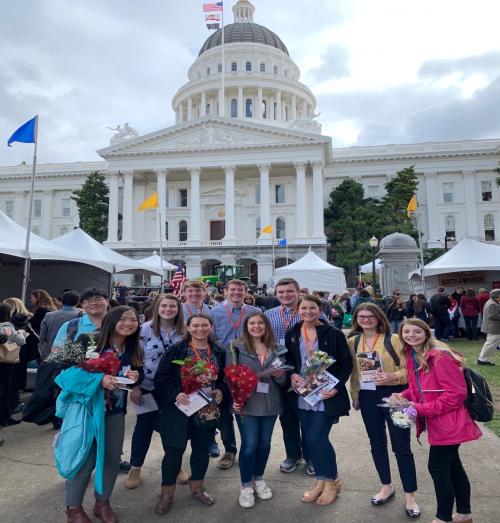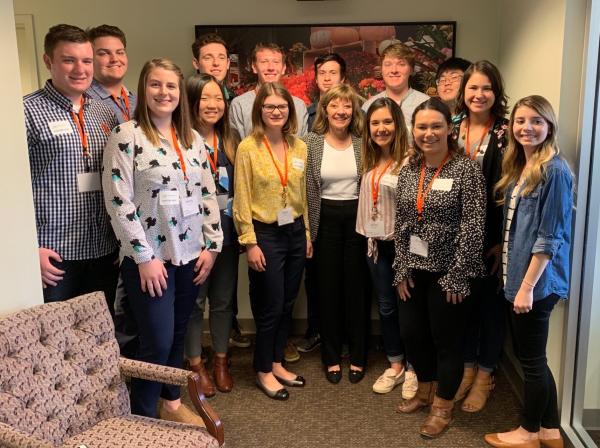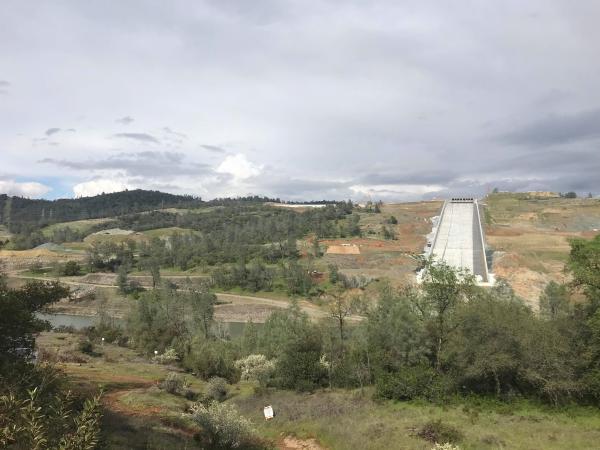Government Involvement: Agriculture Day and Water Projects

Today was the third official day of meetings, continuing on ACE 292’s grand adventure in California! With the extra time and break from classes on Spring Break, it feels like our class has been in the great state for several weeks, rather than just a few days. Even though it’s bittersweet realizing that our time here is more than halfway over, we are truly appreciative of all the amazing opportunities we’ve experienced so far, and we are excited for the remainder of the trip. On Wednesday, March 20, we went to two main locations, the California Department of Food and Agriculture (CDFA) in the state capital, and the Oroville Dam. Our class met with three different speakers, and the topics mainly consisted of the role of state policies.
We first met with Dr. Amrith Gunasekara, the Science Advisor to Secretary Ross at CDFA. His presentation covered government accountability, focusing on the process of working on agricultural issues as they relate to the conservation and sustainability, and seeking out efficient and inventive solutions. One example that Dr. Gunasekara discussed was the role of the California Environmental Protection Agency (CalEPA) in preserving and restoring California’s water resources to serve public health. Unlike the Midwest, which is mostly rain-fed, California persists in having a water shortage problem that is resolved by drip-irrigation (storing water). By having state policies be stronger than federal regulations, the state government is able to greatly assist the state’s 75,000 growers in staying ahead of advancements (technology and research) in agriculture. Dr. Gunasekara also brought up the mission of the Office of Environmental Farming and Innovation (OEFI), which serves the state of California by supporting agricultural production and incentivizing practices through efficiency and creativity in management and science. One key topic that we examined in the meeting was the Dairy Digester Research and Development Program (DDRDP), also known as the “cow poop” program. This big money project provides financial assistance for the installation of dairy digesters in California, which results in reduced greenhouse gas emissions (natural gas methane). Overall, the two major objectives are: 1) greenhouse gas mitigation, and 2) climate change adaptation. Dr. Gunasekara also went over the international collaborations program, which many people in our class studying agricultural policy were interested in.
We then had the honor of meeting with and having a lively discussion with the Secretary of the California Department of Food and Agriculture, Ms. Karen Ross, in an exclusive meet-and-greet in the morning. Earlier in the semester, Secretary Ross spoke to our class via Skype and told us about her duties as secretary, as well as the variety of issues facing California ag, and how they affect her day to day job duties. It was a thrill for us to meet her in person today and see the office in which the issues we discuss in class are worked on every day. We discussed our majors and interests with Secretary Ross, as well as told her our career goals. Secretary Ross then gave us a rundown of the California Ag-day festivities that were occurring later, and recommended we find some free samples that would be given out by groups such as FFA and 4-H. It was a busy day for Secretary Ross, as she had already performed a TV interview in the morning and was scheduled to speak at Ag-day that afternoon. We said goodbye to the Secretary and headed across the street to the state capitol to explore the capitol, before heading onto the front lawn for the Ag-day festivities.

(Meeting with Secretary Ross in her office at the CDFA in Sacramento! It’s amazing to see an influential person be so passionate about her work, and to be so engaged with the future generation. What an empowering woman!
(Fun day at Agricultural Day in the state capitol! So many fun booths)
With our visit to Sacramento over, we went to see the Oroville Dam in Oroville, California, to get a better understanding of the different water projects in California, with Chief Engineer Tracy Pettit. Her presentation, while more focused on the public policy aspects of the water projects, were still insightful regarding agriculture in California, as well as water use in the state. Ms. Pettit spoke about how the state and federal agencies work with and around each other, and how the facility achieves its environmental goals alongside water usage goals. Flexibility is an asset! We then went on a tour of the dam and learned about the dam’s hatchery for different species of fish.

(The tallest dam, ever!)